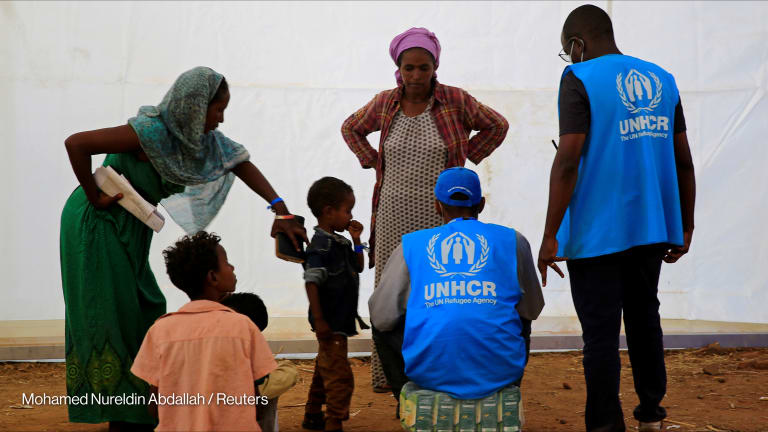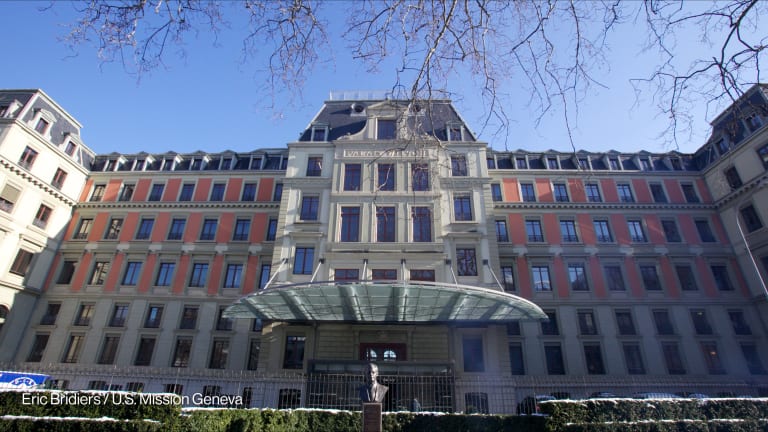6 ways to recruit and retain talent in South Sudan
What does it take to attract and retain staff in one of the world’s most unstable countries? Devex spoke with leaders of several agencies operating in South Sudan to better understand the challenges — and to glean tips for how to do it well.
JUBA, South Sudan — When South Sudan gained independence in 2011, the international community eagerly poured billions of dollars into its development. Aid agencies set up offices around the country and people flocked to advance the world’s youngest nation. When the country erupted into civil war in 2013, the situation changed drastically. Government and opposition forces have been fighting in pockets across South Sudan for more than three years, creating an unstable and insecure environment to live and work in. This poses various challenges for NGOs and humanitarian organizations looking to recruit and retain both national and international staff. Across the board, most recruiters in South Sudan agree that one of the biggest issues they face when recruiting national staff is the lack of a clear recruitment network for both the candidates and the employers. “The few channels that are available are mainly NGO websites that can only reach a limited number of candidates who have access to internet,” said Peter Daniel Deng, managing director for Juba-based Homeland International Recruitment and Consultancy Agency. According to Deng, those without access to the internet have to rely on job boards, but this isn’t always reliable for groups aiming to recruit the most qualified people. “There’s a gap between blatantly advertising and getting the replies,” said Tim Berke, IsraAID’s country director in South Sudan. Word of mouth, he said, is by far the most effective tool to find eligible people. Churches will also often make announcements at the end of a service, which can reach about 3,000 to 4,000 people, he added. For international staff, most of the organizations Devex spoke with cited retention, rather than recruitment, as the top challenge. This is mainly due to the restrictive nature of the conditions in the country, where being required to abide by curfews can lead to a stymied social life. “I think people are committed to the work and are here for usually for the right reasons,” Berke said. “But it becomes difficult in terms of a social life. You work until 6 and have a curfew at 7 so it’s hard to socialize and keep people.” A high turnover rate also plagues international staff recruitment. Most people come for contracts lasting six months to a year, after which they either leave to further develop their careers or take a job with another NGO in the country in order to secure a pay raise. Berke said he introduces himself to the same organizations every few months in order to maintain a rapport with the constant flow of new people. Devex spoke with leaders of several agencies operating on the ground to better understand the challenges of recruiting, developing and retaining a strong team in South Sudan — and to glean tips for how to do it well. Here’s what we learned. 1. Provide training and professional development “Give people the opportunity to develop,” said Jeronimo Esquinca, human resources development officer for Médecins Sans Frontières in South Sudan. If you want to build a better team, he said, you have to know how to develop areas for opportunities in different contexts. MSF, for example, offers management and language skill training for both national and international staff, training for their HR personnel, IT management training, and technical training for medical staff. Deng of HIRCA echoed these sentiments, and said that by conducting long-term training and continuation programs for employment, you’re more likely to create a sense of job security. Career development opportunities can be used to attract and retain staff, as well as create room for job promotions and managerial level positions. 2. Develop a strong human resources department In order to understand the true nature of the workforce in South Sudan, organizations need to spend time developing activities that connect national and international staff. A good exercise to consider is a cultural orientation, where all staff have the chance to express and share their backgrounds and culture, as well as their preferred work culture, Deng suggested. "When you develop these activities, it allows the staff to understand each other better," he said. "A South Sudanese staff [member] will understand, for example, that someone from the States likes someone who can express their opinion, even if it's to the boss." When it comes to how exactly to recruit national staff, Deng says HIRCA uses many different avenues. These include advertising in newspapers and social media, as well as distributing posters in educational institutions such as the University of Juba or the Catholic University of South Sudan and other training institutions within Juba. They also target ministries and civil service offices. In general, it's extremely competitive, Deng noted. Once word of an open position spreads, people flock to it — which is what happened in June when their team was recruiting for a new position. “We contacted our first candidate to start the process,” Deng explained. “That candidate then referred us to three others and by the end, the first candidate wasn't the one we hired. We took his friend instead." 3. Encourage time off Burnout is one of the biggest challenges humanitarian workers face in South Sudan. “Our staff have tons of work and even though they’re very committed and engaged, there’s only so much one person can do,” MSF’s Esquinca said. “They have to rest, it’s very important.” Humanitarians in South Sudan are spread thin: 7.5 million people in the country are reliant on aid. In 2017, humanitarians are targeting 5.8 million of them. Most aid workers never switch off, working around the clock and even on weekends. Something Berke encourages his staff to do, for those who can, is to work remotely when possible. If someone is taking a weekend trip to Nairobi, for example, he’ll suggest they take a few extra days on either end to work from there. For national staff who might not be able to work from outside the country, he advises organizations to be flexible. “If there’s a problem at home or if someone’s sick, people have to be more flexible than you would be in other situations,” he said. “They’re dealing with a lot of stuff outside of the office as well as in the office.” 4. Be transparent about the hiring process “People have heightened senses about transparency here,” Berke said, adding that it’s a good idea to be open about how you’re hiring and who you’re hiring. Due to deep ethnic and political divides in South Sudan, people’s perceptions of how jobs are distributed often invites scrutiny from the community. To avoid this as much as possible, it’s important to have a diverse hiring committee in terms of title, job and gender, Berke said. 5. Trust and take advantage of the incredible skills of national staff One hurdle organizations must overcome in relation to national staff recruitment is the shortage of experienced South Sudanese applicants. “South Sudan is still young and inexperienced,” Deng said. “There are less well vetted candidates.” Due to a lack of qualified people, organizations are more likely to compromise and take a candidate with a different educational background than what is required for the position, he said. This often results in NGOs spending a lot of time and resources in training staff — although this can also provide opportunities, according to MSF’s Esquinca. There is great opportunity for local and expat staff to learn from each other and share skills. “Invest in the complementarity of the national and international staff,” Esquinca said. The other key is to trust your national staff, Esquinca said: “Sometimes we get the idea that the external perspective can offer a more adequate mapping of the resources that we have. But I find that the national staff have the best mapping of the resources that they have here.” 6. Connect staff with a purpose “You get the staff to stay if they feel that what you’re doing is of value and is important,” said Amandine Colin, South Sudan’s communications manager for MSF. MSF is able to connect their staff with a purpose by being transparent with their teams about the quality of their operations, Colin said. This includes explaining and openly discussing their successes and failures, as well as the challenges they face. Internal debates are a key element to MSF's success, she added: "We need to engage with the staff on a regular basis and question the quality of our work and how to improve our operations.” Devex Professional Membership means access to the latest buzz, innovations, and lifestyle tips for development, health, sustainability and humanitarian professionals like you. Our mission is to do more good for more people. If you think the right information can make a difference, we invite you to join us by making a small investment in Professional Membership.
JUBA, South Sudan — When South Sudan gained independence in 2011, the international community eagerly poured billions of dollars into its development. Aid agencies set up offices around the country and people flocked to advance the world’s youngest nation.
When the country erupted into civil war in 2013, the situation changed drastically. Government and opposition forces have been fighting in pockets across South Sudan for more than three years, creating an unstable and insecure environment to live and work in.
This poses various challenges for NGOs and humanitarian organizations looking to recruit and retain both national and international staff.
This story is forDevex Promembers
Unlock this story now with a 15-day free trial of Devex Pro.
With a Devex Pro subscription you'll get access to deeper analysis and exclusive insights from our reporters and analysts.
Start my free trialRequest a group subscription Printing articles to share with others is a breach of our terms and conditions and copyright policy. Please use the sharing options on the left side of the article. Devex Pro members may share up to 10 articles per month using the Pro share tool ( ).
Sam Mednick is a Devex Contributing Reporter based in Burkina Faso. Over the past 15 years she has reported on conflict, post-conflict, and development stories from the Middle East, Africa, Asia, South America, and Europe. She recently spent almost three years reporting on the conflict in South Sudan as the Associated Press correspondent. Her work has also appeared in The New Humanitarian, VICE, The Guardian, Foreign Policy, and Al Jazeera, among others.








